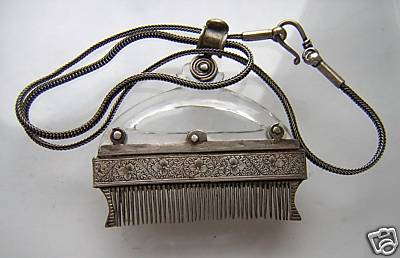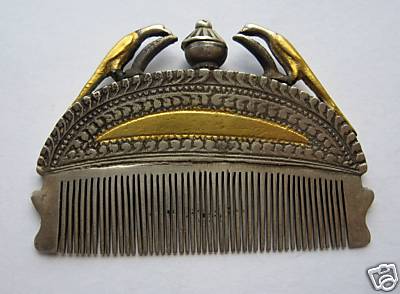FWP:
For background see S. R. Faruqi's choices. For more on Ghalib's unpublished verses, see the discussion in {4,8x}.
On the literary use of baa;Ndhnaa as 'to versify', see {108,1}.
The commentators read the verse as recounting the guilt and punishment of the comb; this isn't very satisfactory even to them, since they have trouble envisioning the binding of the comb's 'hands' (that is, its teeth). The wordplay is of course there, but I think they are misreading the general sense of the verse: it's not about the guilt or punishment of the comb, but about the comb's role as an agent of fate or death.
The lover considers it impossible that anyone's heart-- and most especially, his own-- might have fled from the bondage of the beloved's chain-like curls. Why, just the opposite in fact! To flee would be not only un-loverlike, but also impossible: the coming of the comb is as inescapable and inevitable as the coming of death and fate.
The lover's heart is so snugly, so willingly, embedded within the curls that the comb that straightens out the curls, and brings them into some sort of order or restraint, is perceived by the lover as an agent of fate/death. Because it's death to the lover's heart to be combed out of the beloved's hair? Because since the heart refuses to move from the curls, the deadly teeth of the comb will slice it into pieces? Because the lover's heart can't bear to see the beloved's adorably wayward curls being straightened out by the cruel comb? In any case, the result is that the heart, a helpless captive of the curls, meets its destined fate at the 'hands' of the comb.
The heart may be a helpless captive, but the poet is not; for it's the poet who himself deliberately versifies or 'binds' the comb-teeth as 'death/fate'. That is, he versifies the 'hand of the comb' as the 'hand of fate/death'. The 'hand of fate' is a cliche in Urdu just as it is in English; in fact, Ghalib specifically uses dast-e qa.zaa in {38,2}, so it's easy to see it lurking in dast-e shaanah bah qa.zaa .
Would the comb-teeth have such a deadly, cosmic role, if the poet didn't confer it upon them in his verse? Perhaps not. For the reason that no one flees from the curls isn't because the comb-teeth are as intrinsically un-fleeable as death/fate. Rather, it's that the poets versify the comb-teeth in the guise of death/fate. Perhaps they're just recognizing an objective reality-- but the ghazal world being what it is, it's at least as likely that they're creating a reality of their own.
Just for pleasure, here are two nineteenth-century Indian combs; one has a rock-crystal handle and a chain for wearing around the neck, and the other contains a small built-in perfume vial.


Asi:
Oh Lord, who was the kind of captive whose heart had fled from the beloved's curls? And because the comb helped in this flight, to this day its hands are bound behind its back. Consider the two ends [baazuu] of the comb to be its 'hands'.
== Asi, p. 167